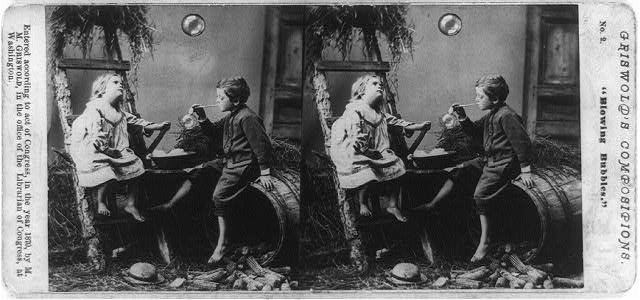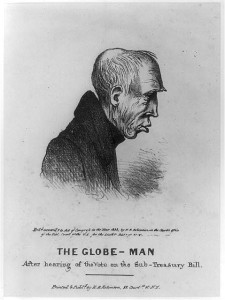We seem to hear a lot nowadays about economic bubbles – for example, the housing bubble of recent years. 150 years ago today Gothamites could see the bubble concept applied to any hope of successful peace negotiations between North and South.
From The New-York Times January 28, 1865:
THE PEACE BUBBLE.; RESULT OF MR. BLAIR’S MISSION. HE ADMITS IT TO BE “A FAILURE.” THE TERMS OF JEFF. DAVIS. Independence First and an Armistice Next. SPIRIT OF THE REBEL PRESS ON PEACE. VERY HOPEFUL DISPATCH. THE REBELS ON PEACE.
Special Dispatch to the New-York Times.
WASHINGTON, Friday, Jan. 27.
The peace bubble that has for ten days past floated so brilliantly before the gaze of men, has to-day come to a sudden collapse. Late last evening FRANCIS P. BLAIR, Sr., returned from Richmond, and brought with him precisely what sensible men expected — that is, just nothing. He brought neither olive branch in his hand, Peace Commissioners under his cloak, nor a treaty in his pocket. His mission, so far as practical results are concerned, is, in fact, as Mr. BLAIR expressed himself to-day, “a total failure.”
That JEFF DAVIS desires peace, his own oft-repeated official announcements leave us no room to doubt; but we now know that as condition precedent to any overture looking to this end, he demands, first, that negotiations shall be conducted as between two independent nationalities; and, second, that pending such negotiations an armistice shall be proclaimed.
Neither of these propositions, it need be said, can be accepted by this Government. To yield either would be, in fact, to surrender the whole issue of the war. There is not the slightest disposition on the part of the Administration to do either the one or the other.
The dominant tone of the rebel chiefs is substantially indicated in a semi-official utterance published in JEFF. DAVIS’ organ, at the very time Mr. BLAIR was in Richmond. It is comprised in the distinct alternative, “independence or subjugation.” In such an alternative there is no room for hesitation on our part.
Turning aside, therefore, from this dream of peace, which has for a time beguiled so many, the nation soberly addresses itself to the work of war, through a continued vigorous prosecution of which a satisfactory peace can alone be obtained. The rebellion will be ended as most rebellions are ended, by internal disruption and collapse. It will leave no treaty in history — no treaty in which the names of “JEFFERSON DAVIS” and “ABRAHAM LINCOLN” will appear as arbitrators of peace.
PHILADELPHIA, Friday, Jan. 27.
The following is a special dispatch to the Philadelphia Evening Telegraph:
[We (New-York TIMES,) publish it merely because it is sent — not because we believe it. We do not believe it has any foundation whatever, except in the imagination of the person who wrote it!]
WASHINGTON, Friday, Jan. 27.
It is now definitely known that Mr. BLAIR’s mission to Richmond has been crowned with complete success.
Mr. DAVIS pledged himself to send, immediately, three gentlemen to Washington to confer upon terms of peace.
Mr. DAVIS stated distinctly to Mr. BLAIR that he would conclude peace and return to the Union upon terms that would be perfectly satisfactory to Mr. LINCOLN and Congress.
Mr. BLAIR also had an interview with Gen. LEE, who avowed himself desirous of ending the rebellion by laying down their arms and returning to the Union. …
From the Richmond Sentinel, Jan. 25.
The rumors circulated yesterday of an armistice for three months, has its answer in the thunder of the cannon below the city. These rumors of peace and of suspension of hostilities can have no other effect than to raise false hopes in the minds of the people. The shortest way for peace is to prepare vigorously for war. The enemy will never make terms with us until they are convinced we will fight on for all time and achieve our independence. The more we talk about peace the more arrogant they become. Men who are continually whining about peace, but prolong the war, as they well know there can be peace but in two ways, “subjugation or independence.” …
You can get a better idea of what was really going on in the peace maneuvers at Civil War Daily Gazette
The Library of Congress explains the 1838 caricature of Francis P. Blair, Sr. here



